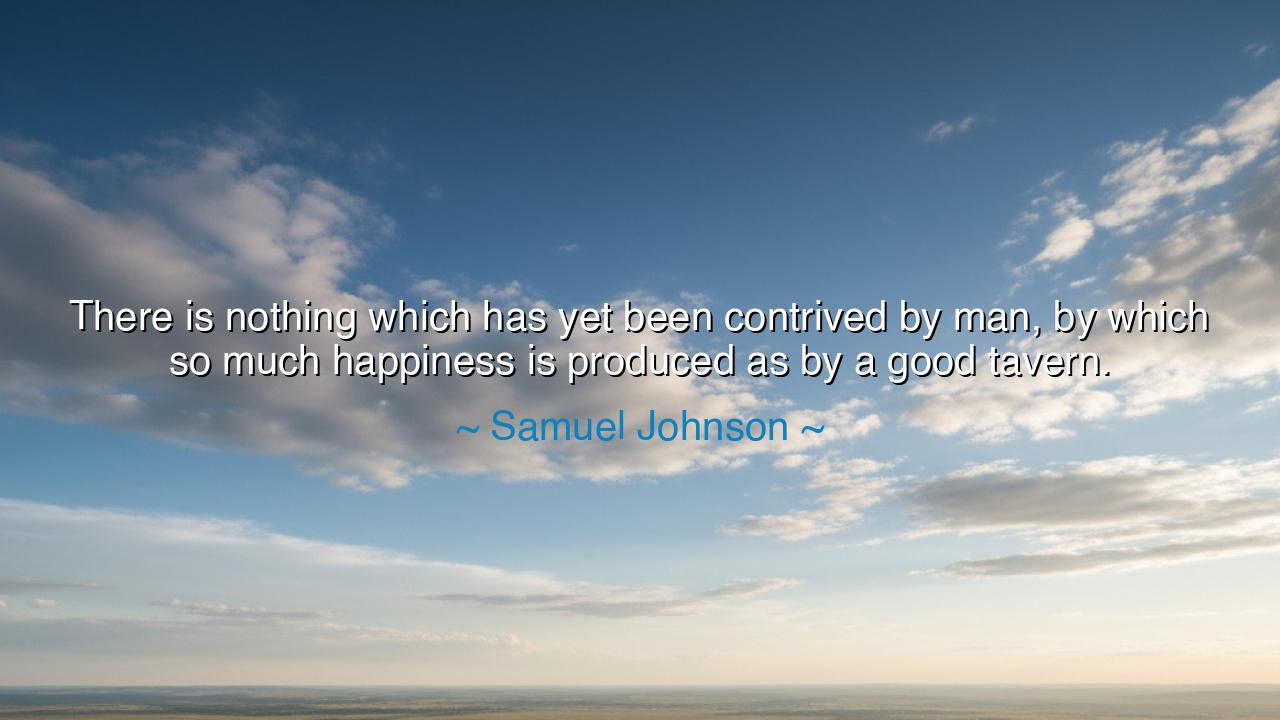
There is nothing which has yet been contrived by man, by which so
There is nothing which has yet been contrived by man, by which so much happiness is produced as by a good tavern.






When Samuel Johnson, that great English sage of the eighteenth century, declared, “There is nothing which has yet been contrived by man, by which so much happiness is produced as by a good tavern,” he was not merely speaking of ale and merriment. He was speaking of fellowship, of the warmth of human connection, of the sacred space where laughter dissolves the burdens of the day and souls meet as equals. The tavern, in Johnson’s world, was far more than a place of drink — it was a sanctuary of community, a hearth for weary hearts, a temple for conversation and mirth. In that humble establishment, the scholar and the laborer, the poet and the tradesman, could gather and remember what it meant to be human.
In an age before the digital glow of screens or the noise of endless distraction, the tavern stood as the great equalizer. It was a place where solitude found company, and sorrow found comfort. The clinking of glasses, the murmur of conversation, and the laughter rising like incense were, to Johnson, the music of civilization itself. For he knew that happiness is not a possession to be hoarded, but a flame that grows brighter when shared. And where better could it be shared than in the gathering place of hearts — where friendship warms the soul as surely as fire warms the hands?
To understand the origin of this wisdom, one must see the world through Johnson’s eyes. He lived in London during the coffeehouse and tavern age — when such places were the lifeblood of intellectual and social exchange. There, in the smoky air and under dim candlelight, men debated philosophy, recited poetry, and pondered the great questions of life. Johnson himself, along with his dear friend James Boswell, often frequented such establishments, where conversation flowed as freely as wine. For Johnson, who struggled with melancholy all his life, the tavern was not an escape, but a remedy — the human balm for isolation. In the fellowship of others, his mind was lifted, his spirit soothed, his heart reminded of joy’s simple power.
The “good tavern,” then, is not defined by its finery or its drink, but by the goodness of its company. It is the place where pretenses fade and sincerity reigns. In its light, one forgets the distinctions of wealth and station; laughter unites where pride divides. There, the merchant may joke with the philosopher, and the poet may argue with the soldier — yet all depart as friends. This, Johnson understood, was civilization at its best: not the grand halls of power, but the simple table shared among equals, where minds and hearts commune in warmth. It was in such spaces, he believed, that the true fabric of society was woven.
The ancients, too, knew this truth. The Greeks gathered in symposia, feasts of wine and conversation, believing that shared joy was a form of wisdom. Socrates himself taught amid laughter and drink, understanding that the soul is more open to truth when at ease. Even the early Christians broke bread together, finding holiness not in grandeur but in communion — the act of togetherness. Across time, humanity has always sought this sacred fellowship, and the tavern, in its humble way, became its inheritor. It is a place where the divine spark of joy is rekindled through laughter, through story, through the reminder that none of us are alone.
Consider the example of Charles Dickens, another son of England, who wrote of taverns, inns, and public houses as places where the lonely could find belonging. In his works, the tavern often appears as a refuge — a place where kindness lingers amid hardship, where even the poor can feel rich in spirit. Dickens, like Johnson, understood that happiness does not depend on grandeur but on connection — the small, shared warmth that sustains humanity when the world grows cold. Such places, however humble, hold a power greater than gold: they remind us that joy is not solitary but communal.
From this, we may draw a lesson as enduring as the tavern itself: seek not happiness in isolation, but in fellowship. The good life is not built on luxury, but on shared laughter, honest conversation, and the gentle presence of others. In our age, where many sit surrounded by noise yet live in silence of the heart, we must rediscover this truth. Go forth and gather. Share a meal, a story, a song. Put aside complaint and pretense. Look into another’s eyes and see the spark of kinship there. For in doing so, you will find what Johnson found in his “good tavern” — that the greatest joy man has ever contrived lies not in invention, but in companionship.
So, my listener, let this be your remembrance: a good tavern is not a place, but a spirit — the spirit of unity, warmth, and laughter shared among souls. Wherever people come together in kindness and openness, there the tavern’s light burns. Keep that flame alive. For long after the wine is gone and the laughter fades, it is the memory of connection that endures — and it is that memory, humble yet holy, that gives life its sweetest taste.






AAdministratorAdministrator
Welcome, honored guests. Please leave a comment, we will respond soon